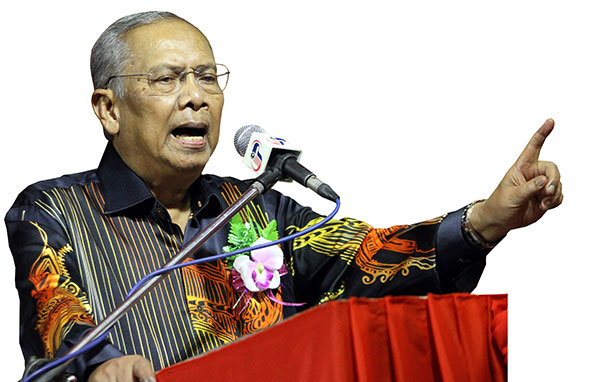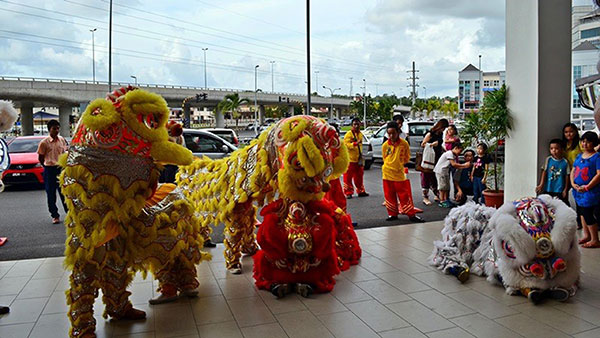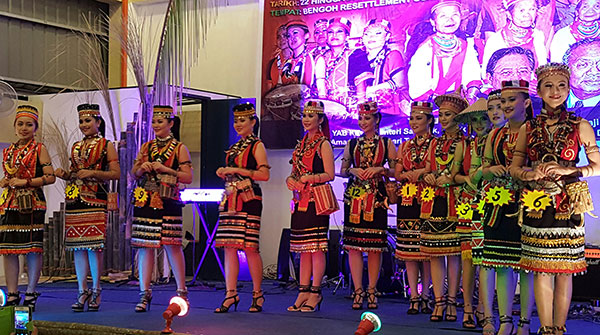
Adenan speaking at a Chinese New Year gathering.
HE sees and listens with his heart and acts on it with assertiveness.
When he speaks, he means it, and he has made a big impression on not just his own but also all the other communities in Sarawak as since taking office in 2013.
He has shown what he is prepared to do — and can do — for the people of Sarawak even over a short period of time. He has made, especially the Chinese and the native communities, feel they belong to Sarawak and are being appreciated as Anak Sarawak.
He has helped the natives of Sarawak win their battle to classify them as ‘Dayak’ on official government forms, and assured the Chinese they will never be called ‘pendatang’ or immigrants in Sarawak.
Datuk Patinggi Tan Sri Adenan Satem is seen as the right man to lead Sarawak and at the right time as the state’s fifth Chief Minister.
Anecdotal evidence indicates Sarawak has more than 40 sub-ethnic groups, each with its own distinct language, culture and lifestyle. In general, there are six major ethnic groups — Iban, Chinese, Malay, Bidayuh, Orang Ulu and Melanau.
It is believed the Chinese people first came to Sarawak as traders and explorers in the sixth century. Today, they make up 24 per cent of the population, consisting of communities built from the economic migrants of the 19th and the early 20th centuries.
While certain quarters in Peninsular Malaysia have called Chinese Malaysians pendatang, Adenan has taken a strong stand against these ultras, even warning them to stop it.
In defending his stand, he pointed out that the Chinese community could not be regarded as immigrants as they were the fourth or fifth generation of Chinese households bred and born in Sarawak.
“I wish to convey to the Chinese community you’re here for hundreds of years — for four to five generations. So don’t call the Chinese pendatang — it’s not good. You’re Malaysian citizens and Anak Sarawak. Maybe during your great grandparents’ time, yes, but not now after four or five generations.
“You’re Chinese, sometimes you go to China to visit your relatives but after that, you will come back here (Sarawak).
“You’re there (China) just for holidays and after that, you come back because this is your home,” he was quoted as saying.
The Inter-Governmental Committee Report (IGCR) which forms the basis for the construction of Malaysia Agreement 1963 and the formation of Malaysia, is very clear on the citizenship issue.
Article 2 states that any person of or over the age of 18 years and ordinarily residents in Sarawak or North Borneo on Malaysia Day but who does not become a citizen of Malaysia by operation of law should be entitled during the first eight years after Malaysia Day (September 16, 1963) to be registered as such a citizen if he satisfies the Federal Government that (a) he has resided before Malaysia Day in North Borneo or Sarawak (whether in one or more of them) or after Malaysia Day in any part of Malaysia for periods amounting to seven years out of the 10 years preceding his application and which include the 12 months immediately preceding his application; (b) he intends to reside permanently in Malaysia and (c) if he is of good character.
Adenan’s stand on the Chinese status in Sarawak has won him a lot of admiration not just from Sarawak Chinese but also Malayan Chinese from Peninsular Malaysia.

The traditional lion dance is normally performed during festivals of the Chinese community.
Admirable attributes
A prominent local Chinese community leader Dr Chou Chi Ming said the Chinese community in Sarawak and in the other states openly admire Adenan’s courage and political wisdom.
“He has made a timely and correct political statement as he fully understands the history of Sarawak and Malaysia, and the operation of law relating to citizenship of the country.
“He has routed the ultra nationalist elements and racialists for their pendatang slur.
“They are the group of undesirable elements out to undermine our national unity nurtured, fostered and built through racial harmony,” added the chairman of the Chinese Community Charitable Trust Board.
Chou, who is also the immediate past president of the Federation of Kuching and Samarahan Divisions Chinese Association, believes the Chief Minister has spoken his mind about the pendatang slight against the Chinese without anticipating any political favour in return.
“I don’t think he has spoken out against certain quarters in Peninsular Malaysia for calling the Chinese pendatang to win Chinese votes. What he has done is to clear up the wrong views and prejudices spread by ultra nationalists and racialists.
“As he is the CM for all Sarawakians, he is fighting for political equality and social justice,” he said.
Chou believes the Chinese will support Adenan and his team in the upcoming state election not because he has stood firm against the pendatang issue but because he is a great state leader who is serious about creating an efficient and clean government.
Political analyst Datuk Peter Minos lauded Adenan’s stand on the Chinese status in Malaysia, saying it was definitely not nice and proper to call fellow Malaysians pendatang when they, their parents and grandparents were born and had lived in the country for generations.
“If people call me pendatang, I will be very angry. So I can understand why our Chinese friends are unhappy when some people label them as such. Only silly and narrow-minded people give bad names to fellow Malaysians.”
Minos said Adenan had to clear things up as he did not want those loose cannons to discriminate against the Chinese community in the country.
He pointed out that as a leader, Adenan has shown he does not tolerate words or terms that hurt people’s feelings.

Dayak beauties participate in a local pageant.
Setting the record straight
Adenan has also played a significant role in helping the Orang Asal of Sarawak earn their official race status in Malaysia.
The State Interpretation Ordinance 2005 has identified 20 indigenous races as natives of Sarawak — the Bidayuh, Bukitan, Bisayah, Dusun, Iban, Kadayan, Kelabit, Kayan, Kenyah (including Sabup and Sipeng), Kajang (including Sekapan, Kejaman, Lahanan, Punan, Tanjong and Kanowit), Lugat, Lisum, Malay, Melanau, Murut or Lun Bawang, Penan, Sian, Tagal, Tabun and Ukit.
The natives in Sarawak are also better known as Dayaks. And the Dayak peoples came to Borneo thousands of years ago.
Unlike Indonesia, the term Dayak is not officially used to address the ethnicity of Sarawakian natives in Malaysia. And regardless of their vast and deep heritage, the original citizens of Sarawak have been called ‘others’ or ‘lain-lain’ in race status classification on government official forms.
This is both wrong and demeaning to any human being, let alone the natives and the original citizens.
The term lain-lain, used to classify racial status, means the natives in Sarawak, although they are the original citizens of the country, have virtually no identity within any system.
To be listed as lain-lain also means they fall into the same category as foreigners such as Javanese and Bugis and many more — relegating them to alien status even in their own land.
This policy has not gone down well with Adenan who announced in January 2015 that the lain-lain category be erased from official government forms and replaced by the names of the three native communities — Iban, Bidayuh and Orang Ulu, stating their ethnicity next to Bumiputera.
Adenan has even advised the Dayaks to ignore the lain-lain (others) category on official Federal government forms if Putrajaya does not drop it as recommended by a technical committee and requested by the Sarawak government.
The lain-lain issue, the Chief Minister said, stemmed from bureaucrats in Putrajaya not taking into account the fact that the name, Dayak, has been used by the Orang Asal in Sarawak long before Malaysia in 1963.
“How can the Dayaks, the Orang Asal in Sarawak, be lain-lain in their own homeland? Here, you have a people with their own cultures, customs and traditions, and Putrajaya considers them lain-lain,” he was quoted as saying.
After having been labelled lain-lain for more than 50 years, the natives in Sarawak finally saw their dream come true when the Cabinet, on Oct 30, approved ‘Dayak’ as a category on official government forms.
This was announced by Minister in the Prime Minister’s Department Datuk Joseph Entulu Belaun. The approval came after the Sarawak government, led by Adenan, pressed Putrajaya vigorously on the matter.
A new beginning
Minos said Adenan’s success in getting the federal government to do away with lain-lain marked a new beginning for the Dayak community at large.
Being a Bidayuh himself, Minos said the Dayaks did not like being categorised as lain-lain in the same way as Chinese Malaysians dislike being called pendatang.
“The Dayaks are a big group in Sarawak and have their own distinct racial characteristics and cultures. The Chief Minister strongly agrees they must be called for what they are — certainly NOT lain-lain.”
According to Minos, lain-lain connotes that the Dayaks are not a race or too small to be recognised or acknowledged.
He pointed out that terms like pendatang and lain-lain were hurtful to those being targeted, believing this must have been in Adenan’s mind even before he became Chief Minister and he spoke out on the issue not because the election is coming up.
“If I were the Chief Minister, I would do the same and not tolerate such nonsense from a few narrow-minded peninsula people.”
Minos said by now, people should have noticed Adenan is against extremists and fanatics from the peninsula who caused unnecessary tension by hurling insults at others, election or no election.
“That’s why the state government bans these undesirable few from entering Sarawak,” he noted.
Knowing the Chief Minister since the late 70’s, Minos said Adenan does not accept or tolerate nonsense from anyone.
“In particular, he really does not like those few peninsula fanatics who display extremist streaks in their words or deeds.
“These few are a bad lot who only bring venom and poison to society. So by natural inclination, the Chief Minister hits at them and will not give them any face. That’s Adenan — a principled man and a leader with clear principles,” he added.
Minos also said the Chinese and the Dayaks should continue to give Adenan full support as he has been firm in speaking out against not only the extremists and fanatics from Peninsular Malaysia but also the derogatory terms — pendatang and lain-lain — used to label the Chinese and the Orang Asal in Sarawak.
“The Chief Minister can see such terms will cause ill feelings and tension when used to discriminate against others,” he added.
